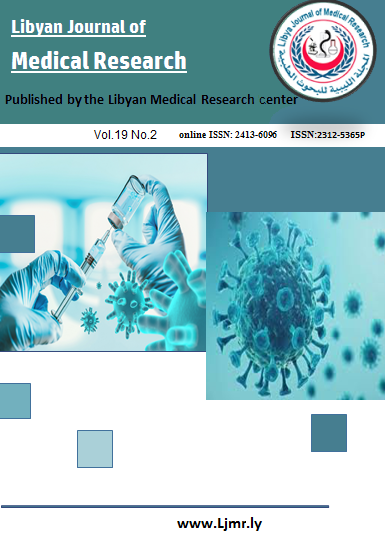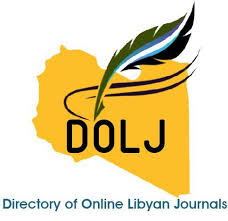Factors Influencing Lower Respiratory Tract Infection in Adult Patients after General Anesthesia
DOI:
https://doi.org/10.54361/LJMR.19.2.45Keywords:
General anesthesia, lower respiratory infection, risk factorsAbstract
Background: After surgery, the LRTIs are significant, as they can result in prolonged hospital stays, increased healthcare costs, and higher morbidity rates. Aim: This study investigated the risk factors in adult patients aged 20 to 40 who have undergone general anesthesia associated with lower respiratory tract infections (LRTIs).
Material and method: Data were analyzed from 40 patients who underwent surgery with general anesthesia at Zawia Hospitals in Libya City between May and August 2023. Results: The analysis revealed that diabetes, intraoperative blood transfusions, and the type of surgery performed were significant risk factors for developing lower respiratory tract infections (LRTIs). Notably, diabetic patients were 0.04 times less likely to develop an LRTI compared to non-diabetic patients. Furthermore, receiving blood transfusions and undergoing cholecystectomy were associated with an increased risk of infection. Pathogen analysis indicated a diverse range of infections, with Klebsiella pneumoniae and Candida species being the most prevalent. Conclusion: This study highlights the importance of effectively managing diabetes, carefully considering blood transfusion needs, and choosing appropriate surgical procedures to lower the risk of LRTIs in patients undergoing surgery with general anesthesia.
Downloads
References
1. Kim, J., Kim, H., & Park, S. (2011). Effects of general anesthesia on pulmonary function. Journal of Anesthesia, 25(5), 675–682.
2. Xu, H., Lian, Y., & Li, X. (2016). Risk factors for postoperative respiratory infections following general anesthesia. Respiratory Medicine, 114, 45–51.
3. Yeh, C., Chen, Y., & Wu, S. (2022). Impact of postoperative lower respiratory tract infections on hospital outcomes. BMC Pulmonary Medicine, 22(1), 110.
4. Amaha, K., Gebrehiwot, M., & Tadesse, Y. (2021). Antibiotic usage and emergence of multidrug-resistant strains in postoperative patients. Infection and Drug Resistance, 14, 3897–3906.
5. Liu, Y., Zhang, X., & Li, Z. (2019). Incidence of postoperative pulmonary infections in adults. Journal of Clinical Anesthesia, 54, 12–19.
6. O’Grady, N., Alexander, M., & Burns, L. (2008). Preventive measures for postoperative pulmonary complications. Critical Care Medicine, 36(8), 2335–2341.
7. Chen, X., Li, Y., & Wang, Z. (2021). Gram-negative bacteria in postoperative respiratory infections: Epidemiology and outcomes. Journal of Clinical Anesthesia, 68, 110143.
8. Xu, H., Lian, Y., & Li, X. (2016). Risk factors for postoperative lower respiratory tract infections following general anesthesia. Respiratory Medicine, 114, 45–51.
9. Liu, Y., Zhang, X., & Li, Z. (2019). Postoperative pulmonary infections in adults: Incidence and associated factors. Journal of Clinical Anesthesia, 54, 12–19.
10. Kim, J., Kim, H., & Park, S. (2011). Effects of diabetes on immune function and postoperative infections. Journal of Anesthesia, 25(5), 675–682.
11. Amaha, K., Gebrehiwot, M., & Tadesse, Y. (2021). Diabetes and postoperative complications: Immune dysfunction and infection risk. Infection and Drug Resistance, 14, 3897–3906.
12. Attaallah, W., El-Said, H., & Hassan, A. (2019). Fungal infections in postoperative respiratory failure: Clinical and microbiological features. Journal of Infection and Public Health, 12(4), 514–521.
13. Bohl, D., Morgan, S., & Slover, J. (2021). Blood transfusions and postoperative complications: A review. Journal of Orthopaedic Surgery, 29(2), 2309499021993764.
14. Chen, H., Xu, M., & Zhou, J. (2023). Surgical invasiveness and postoperative infection risk: Comparative study of appendectomy and cholecystectomy. Surgery Today, 53(4), 456–465.
15. Fukuda, T., Yamamoto, K., & Tanaka, M. (2022). Gram-positive bacterial infections after general anesthesia: Clinical patterns. Journal of Infection, 85(2), 189–198.
16. Lawrence, V. A., Hilsenbeck, S. G., & Noveck, H. (2002). Diabetes and postoperative complications in orthopedic surgery. Annals of Surgery, 236(5), 677–684.
17. Bohl, D., Morgan, S., & Slover, J. (2021). Blood transfusions and postoperative complications: A review. Journal of Orthopaedic Surgery, 29(2), 2309499021993764.
18. Yeh, C., Chen, Y., & Wu, S. (2019). Postoperative outcomes and type of surgical procedure. BMC Surgery, 19(1), 102.
Downloads
Published
Issue
Section
License
Copyright (c) 2025 Rabab Almabrouk Salih, Fatima Ali Al AshkHam, Elham Mohammed Almurabet, Hala Moktar Elgziati, Ghada Emhemed Algblawi (Author)

This work is licensed under a Creative Commons Attribution-NonCommercial-NoDerivatives 4.0 International License.
Open Access Policy
Libyan journal of medical Research (LJMR).is an open journal, therefore there are no fees required for downloading any publication from the journal website by authors, readers, and institution.
The journal applies the license of CC BY (a Creative Commons Attribution 4.0 International license). This license allows authors to keep ownership f the copyright of their papers. But this license permits any user to download , print out, extract, reuse, archive, and distribute the article, so long as appropriate credit is given to the authors and the source of the work.
The license ensures that the article will be available as widely as possible and that the article can be included in any scientific archive.
Editorial Policy
The publication of an article in a peer reviewed journal is an essential model for Libyan journal of medical Research (LJMR). It is necessary to agree upon standards of expected ethical behavior for all parties involved in the act of publishing: the author, the journal editorial, the peer reviewer and the publisher.
Any manuscript or substantial parts of it, submitted to the journal must not be under consideration by any other journal. In general, the manuscript should not have already been published in any journal or other citable form, although it may have been deposited on a preprint server. Authors are required to ensure that no material submitted as part of a manuscript infringes existing copyrights, or the rights of a third party.
Authorship Policy
The manuscript authorship should be limited to those who have made a significant contribution and intellectual input to the research submitted to the journal, including design, performance, interpretation of the reported study, and writing the manuscript. All those who have made significant contributions should be listed as co-authors.
Others who have participated in certain substantive aspects of the manuscript but without intellectual input should only be recognized in the acknowledgements section of the manuscript. Also, one of the authors should be selected as the corresponding author to communicate with the journal and approve the final version of the manuscript for publication in the LJMR.
Peer-review Policy
- All the manuscripts submitted to LJMR will be subjected to the double-blinded peer-review process;
- The manuscript will be reviewed by two suitable experts in the respective subject area.
- Reports of all the reviewers will be considered while deciding on acceptance/revision or rejection of a manuscript.
- Editor-In-Chief will make the final decision, based on the reviewer’s comments.
- Editor-In-Chief can ask one or more advisory board members for their suggestions upon a manuscript, before making the final decision.
- Associate editor and review editors provide administrative support to maintain the integrity of the peer-review process.
- In case, authors challenge the editor’s negative decision with suitable arguments, the manuscript can be sent to one more reviewer and the final decision will be made based upon his recommendations.















